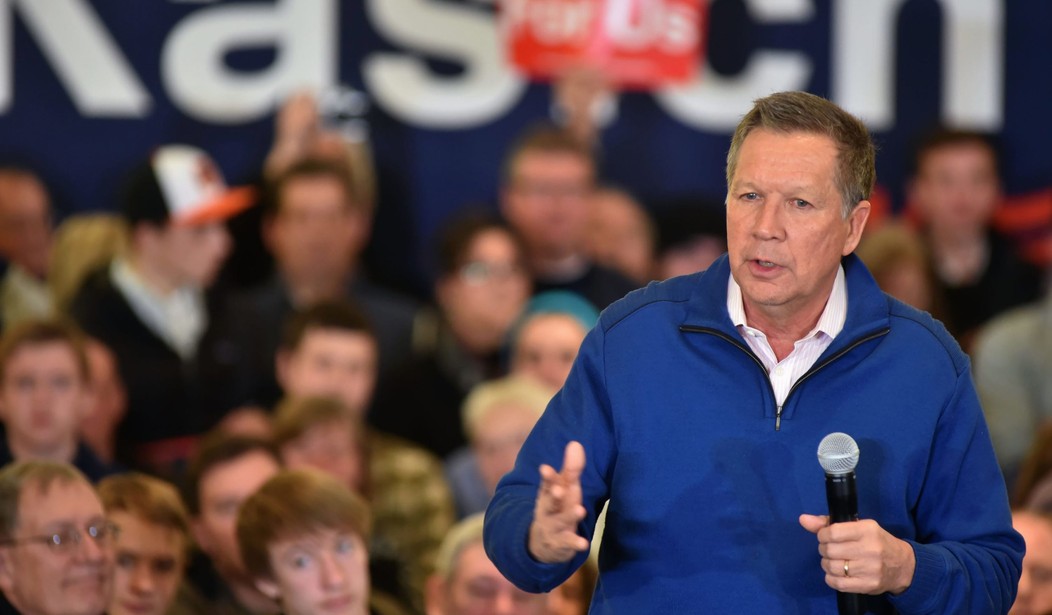Despite a day of voting that left Sen. Ted Cruz (R-Texas) even more insistent that the battle for the GOP nomination is a two-man race, Ohio Gov. John Kasich’s campaign argued that the delegates will not add up in Cruz’s favor moving forward.
Cruz won Kansas with 48.2 percent of the vote, compared to 23.3 percent for Donald Trump, 16.7 percent for Sen. Marco Rubio (R-Fla.) and 10.7 percent for Kasich.
Cruz also won Maine — Trump quipped in a speech that it’s because the state shares a border with Canada, the country of the senator’s birth — with 45.9 percent of the vote. Trump was second with 32.6 percent, Kasich was third with 12.2 percent, and Rubio had 8 percent.
Trump won Kentucky with 35.9 percent, followed by Cruz at 31.6 percent, Rubio with 16.4 percent and Kasich with 14.4 percent.
And in Louisiana, where Cruz had the support of the “Duck Dynasty,” Trump claimed first place with 41.4 percent, followed by Cruz at 37.8 percent, Rubio at 11.2 percent, and Kasich at 6.4 percent.
“The scream you hear, the howl that comes from Washington, D.C., is utter terror at what we the people are doing together,” Cruz told supporters in Coeur d’Alene, Idaho, after his Kansas victory was called.
Rubio traveled to Puerto Rico on Saturday, where he is expected to win on Sunday.
Cruz maintained his calls for Kasich and Rubio to “prayerfully consider” dropping out and letting him go one-on-one against Trump. Trump also called for Rubio and Kasich to drop out so he could run against only Cruz.
With 1,237 delegates needed for the nomination, roughly 378 are pledged to Trump, followed by 295 for Cruz, 123 for Rubio and 34 for Kasich.
In a memo Saturday night, Kasich’s chief strategist, John Weaver, said the governor’s delegate pickups were “better than expected,” especially his single Kansas delegate.
“Our campaign strategy was built knowing that the nominating calendar is frontloaded to benefit the other candidates in the race while it shifts more and more toward a Kasich candidacy the deeper we go into it,” Weaver said. “Despite multiple failed attempts by the political pundits to predict who will become the nominee or the top Trump alternative, our campaign plan is working.”
“No candidate is currently on track to win the nomination outright. Our campaign is built for the long-term, it is growing in strength and it will ensure Governor Kasich is the candidate best positioned to arrive in Cleveland and exit as the nominee.”
Kasich told the Conservative Political Action Conference on Friday that he expects a brokered convention, while Cruz was adamantly opposed to anything but winning the nomination outright and predicted “manifest revolt” across the country if the convention is brokered.
Weaver said Kasich’s campaign fundraising numbers since the Detroit debate are the best they’ve ever been since the days after the governor’s second-place New Hampshire finish.
But, he stressed, “the major inflection point is March 15.”
Florida and Ohio are the only winner-take-all states on that day, and a new ARG poll released Saturday showed Kasich leapfrogging Trump in Michigan. In the ARG survey conducted Feb. 19-20, Trump led Kasich there by 18 points; now, Kasich leads Trump 33 percent to 31 percent.
The last Quinnipiac Ohio poll from mid-February had Trump up by 5 points over Kasich.
“After March 15, more than 1,000 delegates will still be available, and the electoral map shifts significantly in our favor, with the delegate-rich states fitting Governor Kasich’s profile,” Weaver argued.
Those states are: Arizona (58 delegates), Utah (40 delegates), North Dakota (28 delegates) Wisconsin (42 delegates), New York (95 delegates), Colorado (37 delegates), Connecticut (28 delegates), Delaware (16 delegates), Maryland (38 delegates), Pennsylvania (71 delegates), Rhode Island (19 delegates), Indiana (57 delegates), West Virginia (34 delegates), Oregon (28 delegates), Washington (44 delegates), California (172 delegates), Nebraska (36 delegates), Montana (27 delegates) New Jersey (51 delegates), New Mexico (24 delegates) and South Dakota (29 delegates).
“Ted Cruz doesn’t play in the vast majority of these states,” Weaver said. “John Kasich does.”
“Ted Cruz needed to get more delegates out of the southeast and caucus states than he was able to get, and his path is closing. The Marco Rubio hype machine is winding down and his bubble will completely pop on March 15 in Florida if he doesn’t win. Governor Kasich must win in Ohio to stop Trump, and when he wins Ohio, Kasich clearly becomes the top non-Trump Republican.”
On Saturday, Kasich’s camp announced the endorsement of Michael Reagan, who declared the governor would “continue my father’s great legacy.”
Kasich rallies with Arnold Schwarzenegger on Sunday in Columbus. He heads to Michigan on Monday.








Join the conversation as a VIP Member